Candide (Barnes & Noble Classics Series) Read online
Page 2
Having completed his studies in 1711, the seventeen-year-old Arouet adamantly refused to obey his father’s stern injunction to go to law school, for by now he was intent on becoming a man of letters. While still at Louis-le-Grand, he had been introduced to a group of Epicurean libertines, or freethinkers who subsequently congregated at the Temple of the Knights of Malta and therefore became known as the Society of the Temple. He rubbed elbows with young aristocrats chafing under the austere and oppressively religiosity of the court of the aging Louis XIV, who would die in 1715, and his successor, the notorious Philippe II, duke of Orleans, regent of France until 1723. This period was marked in elite and sophisticated circles by a disdainful disregard for traditional values and a hedonistic love of life and of beauty in all its forms, especially in the arts and letters.
Young Arouet thrived in this pleasure-loving milieu, increasingly asserting himself as an aspiring dramatist, and author of light and satirical verses, a wit especially gifted with sharp, ironic repartees, and a skeptic in religious matters. In 1718 he had his first great success with his tragedy Oedipe, his version of the Oedipus myth made famous by Sophocles and also treated by Pierre Corneille, the great seventeenth-century French dramatist. The triumph of his play induced him in 1719 to leave his bourgeois origins behind once and for all by adopting the more euphonious and aristocratic pen name “de Voltaire.”
Meanwhile, he had already gotten a rather bitter taste of Old Regime justice when, as the author of satirical verses directed against the regent, he was forced to spend eleven months in the infamous Bastille prison, from May 1717 to April 1718. Then in 1726 an incident occurred that would mark the turning point in his life and career. Voltaire quarreled with the chevalier de Rohan, scion of one of the most powerful French families, who had his lackeys beat him up for blatantly assuming an aristocratic name; the young writer failed to gather support among his aristocratic friends in his desperate attempts to find redress in a duel with the chevalier, who persistently refused to honor a mere commoner with this distinction. Instead he was once more hustled off to the Bastille, but after a two-week stay was offered the alternative of going into exile. He opted for England.
Voltaire’s stay in England, from May 1726 to November 1728, profoundly transformed and enriched his intellectual and aesthetic outlook, as the Lettres philosophiques (1734), one of his most original and striking works, (an English version titled Letters Concerning the English Nation had appeared in 1733) amply testifies. He vividly and most sympathetically evokes life in eighteenth-century England, primarily in order to contrast it favorably with French laws, customs, traditions, science, philosophy, and even literature. He humorously describes the apparently bizarre mores of the Quakers, primarily in order to underscore religious intolerances in France. Also featured are such powerful political institutions as the English Parliament, with its House of Commons; English empiricist philosophy and science as embodied by Francis Bacon, John Locke, and Isaac Newton; and English tragedy and comedy, with the focus on William Shakespeare as a new kind of genius, untrammeled by classical rules and conventions. From a sharp-tongued wit, a gifted poet, and a dramatist, Voltaire had made himself over into a philosophe who soon would become the undisputed leader of the Enlightenment movement. The book on England was promptly condemned and publicly burned in France, and its author had to seek refuge near the eastern border, in the province of Champagne, at Cirey, where he settled in the château of Madame du Châtelet, a remarkable woman who was a brilliant intellectual and a scientist in her own right.
Voltaire lived in Cirey for fifteen happy and productive years, from 1734 until 1749, when the premature death of Madame du Châtelet left him disconsolate and at long last open to the repeated offers of hospitality of Fredrick the Great of Prussia, a long-time admirer and correspondent of the philosophe, who had been urging him to become his permanent guest at his court at Potsdam.
While at Cirey Voltaire deepened his knowledge of Newtonian mathematics and physics, which in 1738 would result in Eléments de la philosophie de Newton (Elements of Newton’s Philosophy), a distinguished work of scientific popularization. He also pondered the philosophy of Leibniz at the instigation of Madame du Châtelet, and he embarked upon his great cultural histories, most notably Le siècle de Louis XIV (The Age of Louis XIV), published in 1751, in which he pointedly extols the glorious scientific, artistic, and literary achievements of France during the glorious reign of the so-called Sun King at the expense of Louis XV.
During his stay in England and at Cirey Voltaire’s outlook on life was essentially optimistic. In the twenty-fifth and last of his Lettres philosophiques he sternly took Pascal to task for his pessimistic depiction of the human condition, describing him as a “sublime misanthrope” ; and in his poem Le Mondain (The Worldly One), published in 1736, he sharply ridiculed the myth of primitive happiness and innocence during the so-called Golden Age, as embodied in the biblical story of Adam and Eve. Conversely, he extolled the Epicurean delights of comfort and luxury brought about by modern civilization. In spite of his controversial reputation, he garnered such high official honors as being elected to the French Academy in 1746. He was still convinced that, on the whole, Newton’s eminently rational laws permitted human beings to accommodate themselves and seek their happiness within this orderly universe, set in motion by a supremely powerful but also benevolent being. And as a deist, he generally also subscribed to Gottfried Wilhelm Leibniz’s theory that God would not create a universe other than the best of all possible universes, as expounded in his Theodicy (1710).
Voltaire’s stay at the court of Frederick II, from 1750 until 1753, turned out to be an unmitigated disaster. Frederick was basically an autocrat, in spite of his much-publicized image as an enlightened “philosopher king.” Voltaire’s irrepressible wit and bold irreverence were bound to displease and eventually anger his royal host, and eventually Voltaire had to leave Prussia hurriedly and under humiliating circumstances. After some hesitation as to where to find a safe refuge, he settled down in Geneva in December 1759. when he moved to a property he acquired at nearby Ferney, which would be his retreat for the next nineteen years, until shortly before his death in Paris, on May 30, 1778.
Voltaire’s early optimism underwent a profound change under the impact of events in his personal life as well as in reaction to those natural and man-made catastrophes that made him keenly aware of human suffering and misery, not to mention the multiple dangers that constantly threaten our very existence, let alone our well-being and chances of achieving happiness. His own disappointments—notably the unexpected loss of Madame du Châtelet, the unrelenting hostility of the court of Louis XV, the disenchantment with Frederick, and the precariousness of his personal situation—were compounded by his intense and immediate empathy; he spontaneously identified with all victims of calamities, war, injustice, prejudice, and intolerance.
The news of the terrible Lisbon earthquake of November 1, 1755, which claimed tens of thousands of lives, overwhelmed him with dreadful images of women and children buried under the rubble, and inspired his eloquently anguished Poème sur le désastre de Lisbonne (Poem on the Disaster of Lisbon), published in 1756, in which he clearly signals his rejection of Leibniz’s concept of a rational and well-regulated universe. The protracted and devastating Seven Years War (1756-1763), which began when Frederick invaded Saxony and soon expanded the lingering hostilities between France and England into a European conflagration, also deeply affected Voltaire’s outlook on the human condition.
Voltaire began writing philosophical contes (tales) relatively late in his career and almost as an afterthought, for he subscribed to the neoclassical canon and hierarchy of literary genres according to which tragedy in verse and epic poetry gave an author his most reliable passport to posterity and immortality. Novels, short stories, and contes were looked upon suspiciously as upstart genres with no credible aesthetic or even moral pedigree.
Voltaire began with the traditional short story or no
vella, and transformed it into the conte philosophique, or philosophical tale, a fast-moving and highly entertaining story combining multiple adventures and voyages with an underlying philosophical and moral theme, written in a pithy style replete with humor, satire, irony, and sly sexual innuendoes. Indeed, ridicule would be Voltaire’s most effective weapon against his main targets: fanaticism, intolerance, war, and cruelty.
One of Voltaire’s early philosophical tales is Zadig, subtitled La Destinée (Destiny), which appeared in 1747. It is set in the kind of whimsically imaginary and exotic Oriental setting dear to eighteenth-century authors from Montesquieu to Diderot. The uncannily wise, resourceful, and resilient Zadig, whose name derives from the Arabic sadik (“just”), undergoes a number of trials and tribulations, and when faced with disconcerting instances of injustice and suffering, and with the unpredictability and apparent randomness of life in general, anxiously questions and even objects to the notion of a world regulated by a benevolent Providence. But Zadig eventually overcomes adversity and reluctantly submits to the reassuring belief that Providence works in mysterious and unfathomable ways for the ultimately greater good of humanity.
While still in Prussia, Voltaire published Micromégas in 1752. Partially inspired by Swift’s Gulliver’s Travels (1726) and by Cyrano de Bergerac’s two fantastic romances about visits to the moon and sun—Autre Monde: ou, Les Estats et empires de la lune (1657) and Les Estats et empires du soleil (1662)—it is a science-fiction story of fantastic, humorous interplanetary travel that strongly reflects Newton’s cosmology and Locke’s empiricism, and that pointedly resorts to fictional and comic devices in order to fuse science and moral philosophy. In a universe of multiple planets inhabited by creatures of various gigantic dimensions, the remarkable scientific knowledge of the minuscule earthlings is duly acknowledged, but at the same time their basic ignorance in matters of ultimate human values, masked by hubris and pedantry, is pointedly ridiculed and excori ated, especially when viewed from the perspective of two extraterrestrial visitors, Micromégas, the giant originating from Sirius, and his smaller but still huge traveling companion, whom he had picked up on the planet Saturn in the course of his celestial peregrinations.
Candide, the hero of the philosophical tale by that name, came into the world in January 1759 unacknowledged by his creator. The work was proposed as a translation “from the German of Doctor Ralph, with the additions found in the Doctor’s pocket when he died at Minden, in the Year of Our Lord 1759.” It was customary for Voltaire to deny the paternity of his most potentially controversial writings by mischievously attributing them to imaginary or even real persons to maintain a near total silence about the circumstances and composition of his works of prose fiction.
Voltaire was hardly an introspective author, and in this, as in so many other respects, he stands at the opposite pole from Jean Jacques Rousseau, who insisted, in full knowledge of the dangers involved, on publicly proclaiming the authorship of all his writings and who in both his Confessions (1781, 1788) and correspondence provides much detailed information on their genesis, publication, and immediate public response, as well as official reaction.
Another explanation for Voltaire’s reticence about his philosophical tales is his understandable if mistaken belief that these were relatively inconsequential productions belonging to the much decried and maligned genre of the novel, and that they would not fare well with future readers, especially when considered alongside his far more ambitious and serious works—his tragedies, epic and philosophical poems, and historical essays. Whatever Voltaire’s own motives or thinking about Candide may have been, there is a persistent but erroneous legend that he dashed off by dictation the thirty chapters of the tale in three days. It is of course far more likely that he wrote Candide over a ten-month period in 1758 and completed the manuscript, with final revisions and additions, in the fall of that year.
The slender book first came off the presses of the brothers Cramer, publishers in Geneva, in January 1759. It was promptly disseminated and repeatedly republished in Paris and elsewhere. Even though it was swiftly condemned by both French and Swiss authorities, and copies were seized in printing shops in Paris and Geneva, it sold briskly under the counters. No official effort to suppress Candide could prevent it from becoming one of the most sensational forbidden best-sellers of pre-Revolutionary France and indeed Europe. Within a year, there were at least three English translations and one edition in Italian.
In 1758 the sixty-four-year-old Voltaire had personally experienced an unusually vast range of human situations and emotions, and he had become keenly aware of the existence of evil, unhappiness, and injustice in this world. He had also come to the realization that there were no satisfactory theological or philosophical explanations to justify or account for the horrors that so persistently dog humankind.
He had acquired an enormous intellectual and multicultural frame of reference thanks to his unquenchable intellectual curiosity, through his omnivorous reading, and especially through his extensive research for his historical works and philosophical essays. He was now at the height of his powers and in full possession of his craft as a writer who over the decades had tirelessly practiced, perfected, and mastered all the literary genres and rhetorical techniques and devices.
The reasons for Candide’s immediate and enduring success with readers are many. It is a supremely wrought tragicomedy that slyly and irresistibly induces us to laugh at and simultaneously reflect upon the most dreadful events that befall humankind. It appeals to us today because, nearly 250 years after its publication, it has lost none of its relevance or satirical sting. It is particularly modern and pertinent because its dark cosmic vision is essentially in keeping with our own awareness of what separates our need for order, clarity, and rationality from the brutal reality of a chaotic world.
The fiercely relentless attack Candide unleashes against the evils of religious fanaticism, war, colonialism, slavery, and mass atrocities is more relevant than ever. The naive, young hero of the tale obstinately seeks personal happiness in a world beleaguered by all kinds of catastrophes wrought by the blind, unleashed forces of nature—such as earthquakes and epidemic diseases—as well as by violent, destructive human passions.
The tale opens with a kind of idyll that revisits in a parodic and rococo mode themes originally brought to life in the Garden of Eden. The castle in Westphalia, which belongs to the proud baron of Thunder-ten-tronckh, and its incongruous inhabitants are for the gentle and innocent Candide a paradise from which he is suddenly and brutally expelled when he is caught kissing Cunégonde, the baron’s daughter, a pleasingly plump, wholesome, and docile young woman.
A gentle, honest, and appealingly naive young man, reputed to be the illegitimate offspring of the sister of the baron Thunder-ten-tronckh and an honorable nobleman whom she refused to marry because of his insufficiently ancient lineage, Candide is the eager and wide-eyed disciple of his pedantic tutor Pangloss, who relentlessly lectures to him on “metaphysico-theologo-cosmolonigology,” a comic formula of Voltaire’s invention meant to ridicule Leibniz’s philosophical optimism.
Throughout the dreadful catastrophes that will befall Candide, Pangloss, and their companions in misery, Pangloss will obstinately and blindly stick to his unshakable belief that “this is the best of all possible worlds.”
Upon being summarily kicked out of the baron’s castle, Candide is immediately plunged into an incomprehensible and unpredictable world ruled by overwhelmingly powerful and evil forces, both natural and human. Forcibly impressed into the army of the king of the Bulgars, he witnesses all the horrors of war in a fierce battle between the Bulgars and the Abares from which he barely escapes with his life. While the kings of the two opposing armies were having solemn “Te Deums” sung, each of his own camp, Candide fled this “heroic butchery” that left behind not only heaps of dead and dying soldiers on the battlefield, but also surrounding villages in ashes, their inhabitants savagely massacred. Candide is be
friended by James the Anabaptist, and also unexpectedly meets Dr. Pangloss, by now reduced to the pitiful state of a beggar grossly disfigured by syphilis. This motley group starts for Lisbon, and their ship is wrecked in a terrible storm off the coast of Portugal. James is drowned, while Candide and Pangloss barely manage to reach the shore of Portugal just as an earthquake shakes its capital, crushing 30,000 inhabitants under the ruins and engulfing what is left of the city in the flames and ashes of terrible fires.
In order to punish those judged wicked enough to have caused this disaster and to prevent other earthquakes from occurring, the rulers of Lisbon treat the people to the spectacle of a splendid auto-da-fé . While Pangloss is hanged, Candide is whipped to within an inch of his life. A charitable old woman takes care of him and leads him to Cunégonde; the damsel had barely survived being raped and stabbed in her father’s castle, and has since become the mistress of Don Issachar, who is a Jew, and the Grand Inquisitor, both of whom Candide finds himself obliged to kill as threatening rivals when they discover him in a compromising situation with the young woman. As a result, the lovers, accompanied by the old woman, flee to Cadiz, where they embark for Paraguay. During the lengthy sea voyage, the old woman, who happens to be the daughter of Pope Urban X and the Princess of Palestrina, relates her own sad story, filled with multiple bloody adventures and calamities in the course of which she was raped, sold into slavery, stricken with the plague, had one of her buttocks cut off, was sent to Russia where she fell to the lot of a boyard who gave her twenty lashes per day, and ended up becoming a servant of Don Issachar and assigned to Cunégonde.
After the ship lands in Buenos Aires, our passengers are the guests of the Governor, who promptly develops a mad and jealous infatuation with Cunégonde. Once more, Candide has to leave behind his beloved and flee for his life, this time in the company of Cacambo, a recently acquired valet, part Spanish and part South American Indian, who had himself acquired a rich and variegated experience of life. Arriving in Paraguay, Candide meets the Commandant of the Jesuits, who turns out to be Cunégonde’s brother; he has also somehow survived the massacre in his father’s castle and has since become a Jesuit priest and a colonel in the King of Spain’s troops. However, upon learning of Candide’s intention of marrying his sister, he becomes enraged and draws his sword, and in the ensuing violent fight Candide has to stab him in self-defense.

 Zadig/L'Ingénu
Zadig/L'Ingénu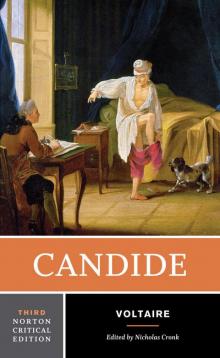 Candide
Candide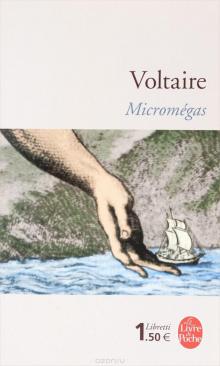 Micromegas
Micromegas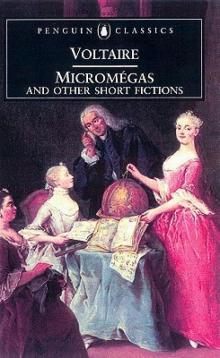 Micromegas and Other Short Fictions (Penguin ed.)
Micromegas and Other Short Fictions (Penguin ed.)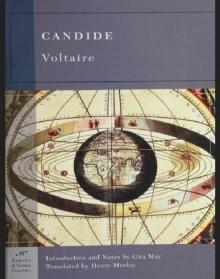 Candide (Barnes & Noble Classics Series)
Candide (Barnes & Noble Classics Series)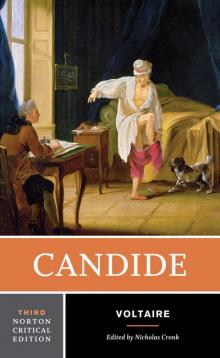 Candide (Third Edition) (Norton Critical Editions)
Candide (Third Edition) (Norton Critical Editions) Zadig or L'Ingenu
Zadig or L'Ingenu